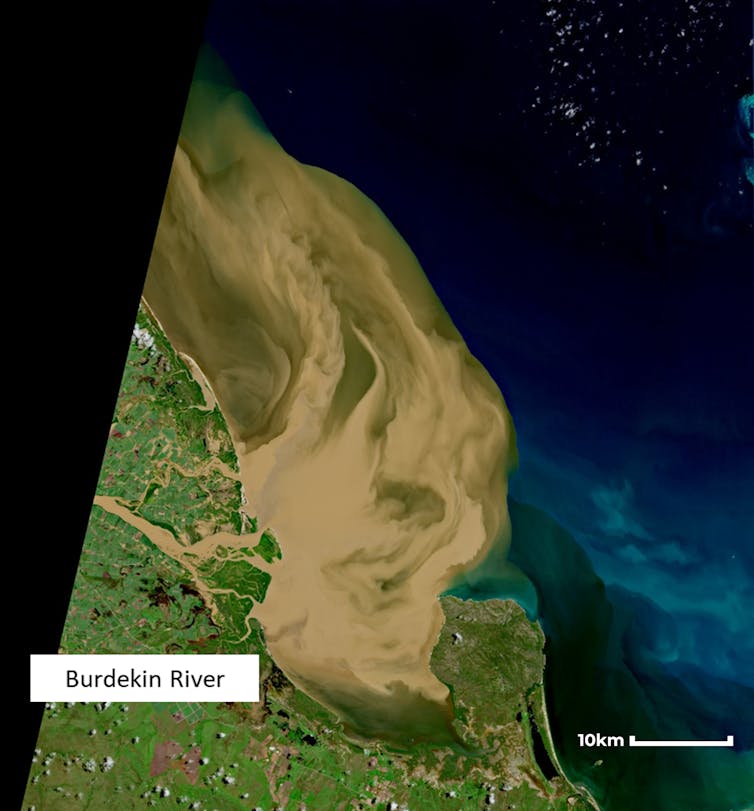UNESCO expresses ‘utmost concern’ at the state of the Great Barrier Reef
- Written by The Conversation

UNESCO’s World Heritage Committee has again raised grave fears for the future of the Great Barrier Reef, highlighting the problems of water pollution, climate change and unsustainable fishing.
The committee this week released draft decisions regarding the conservation of 62 World Heritage properties. This included the Great Barrier Reef, for which it noted:
Overall, while progress has been made, significant challenges remain in achieving water quality targets, managing extreme climate impacts, and ensuring the long-term resilience of the property.
The comments confirm what experts already know too well: despite substantial investments from successive Australian governments, threats to the Great Barrier Reef remain.
Climate change is the greatest threat to the Great Barrier Reef and other coral reefs around the world. But water pollution is the most significant local threat. That issue, along with unsustainable fishing, is entirely within Australia’s control.
The World Heritage Committee will consider the draft decision at its next meeting in Paris in July. It may amend the decision, but the concerns are now on the public record.
What’s all this about?
The Great Barrier Reef has been on UNESCO’s World Heritage list for more than 40 years. The listing recognises outstanding natural and cultural places around the world.
The reef is jointly managed by the Australian and Queensland governments. UNESCO’s draft decision expressed “utmost concern” at the findings of last year’s outlook report, published by the Great Barrier Reef Marine Park Authority. It noted:
the overall outlook for the property remains one of continued deterioration due largely to climate change, while the long-term outlook for the ecosystem of the property also remains ‘very poor’.
Poor water quality persists
Poor water quality is a major issue on the Great Barrier Reef. It is caused when sediment, nutrients, pesticides and pollution from land-based activities, such as land clearing, farming and coastal development, are carried into the ocean.
In its draft decision, UNESCO noted with “regrets” that the latest water quality targets for sediment and nitrogen – a key component of fertilisers – were not achieved. UNESCO said the updated water quality plan should ensure targets and actions “are sufficiently ambitious and funded”.
As the below graph shows, actions from 2009 to now have reduced pollution only by about half the desired amounts. At the existing rate of progress and funding commitments, the targets will not be met until 2047 (for sediment) and 2114 (for dissolved inorganic nitrogen).
Huge gaps exist between current pollutants levels and the water quality targets. These and some other targets are well out of reach under existing funding levels.
The draft decision also requests a halt to illegal land clearing while strengthening vegetation laws – both fundamental to reducing water pollution.
Severe weather events exacerbate the water quality problem. In February this year, for example, floodwaters from ten major rivers merged to form extensive flood plumes along 700 kilometres of coastline from Cairns to Mackay, and up to 100 kilometres offshore.
Such plumes can remain present for months after a flood. They can smother seagrass and corals, and cause damaging algal growth.
The wicked problem of climate change
UNESCO’s draft decision noted “the overall outlook for the property remains one of continued deterioration due largely to climate change”.
Ocean heatwaves can lead to coral bleaching and potentially death. Mass bleaching occurred again this year on the Great Barrier Reef – the sixth such event since 2016.
UNESCO described as “deeply concerning” preliminary results showing heat stress was the highest on record during the 2023–24 mass bleaching event.
Climate change is also expected to produce more frequent and intense extreme weather events such as tropical cyclones, which can damage reefs and island ecosystems.
UNESCO called on Australia to align its policies with the global goal of “limiting global temperature to 1.5°C above pre-industrial levels”, and to take steps to mitigate negative impacts from extreme weather events.
The challenges of fishing
Unsustainable fishing practices damage the Great Barrier Reef. UNESCO’s draft decision noted progress in eliminating gillnet fishing, which is on track for the target of 2027.
The fishing method involves mesh nets which can accidentally kill other wildlife, including threatened species such as dugongs, turtles, dolphins and sawfish.
But smaller nets can still be used throughout much of the World Heritage area, so some threats to threatened species remain.
UNESCO also urged Australia to expand electronic monitoring of commercial fishing vessels, and to ensure the targets in its Sustainable Fisheries Strategy are met. It also called for a comprehensive review of coral harvesting, which primarily supplies the global aquarium trade.
What next?
Despite the significant resources and management efforts Australia expends on the Great Barrier Reef, serious threats remain.
The Great Barrier Reef is struggling under the cumulative impacts of a multitude of threats. The problems outlined above are not isolated challenges.
Both the Queensland and Australian governments could do far more to boost the health of the reef. Clearly, more funding is needed. Without it, the future of the Great Barrier Reef is in jeopardy, and so too its tourism and fishing economies, and thousands of jobs.
UNESCO has now asked Australia to provide more comprehensive results from the recent mass bleaching on the Great Barrier Reef, along with an updated plan to improve water quality. Its draft decision maintains the spotlight on conservation concerns for this precious natural asset.
Support for the aerial footage in the lead image to this article was provided by TropWATER JCU, Great Barrier Reef Marine Park Authority, the Office of the Great Barrier Reef, NQ Dry Tropics and CSIRO.







